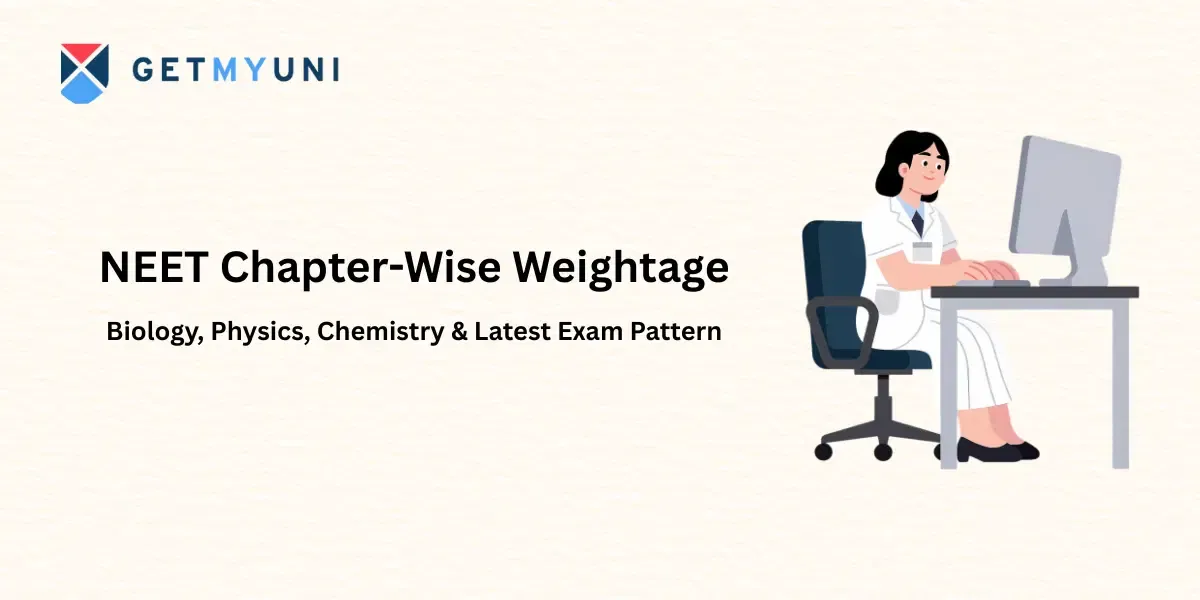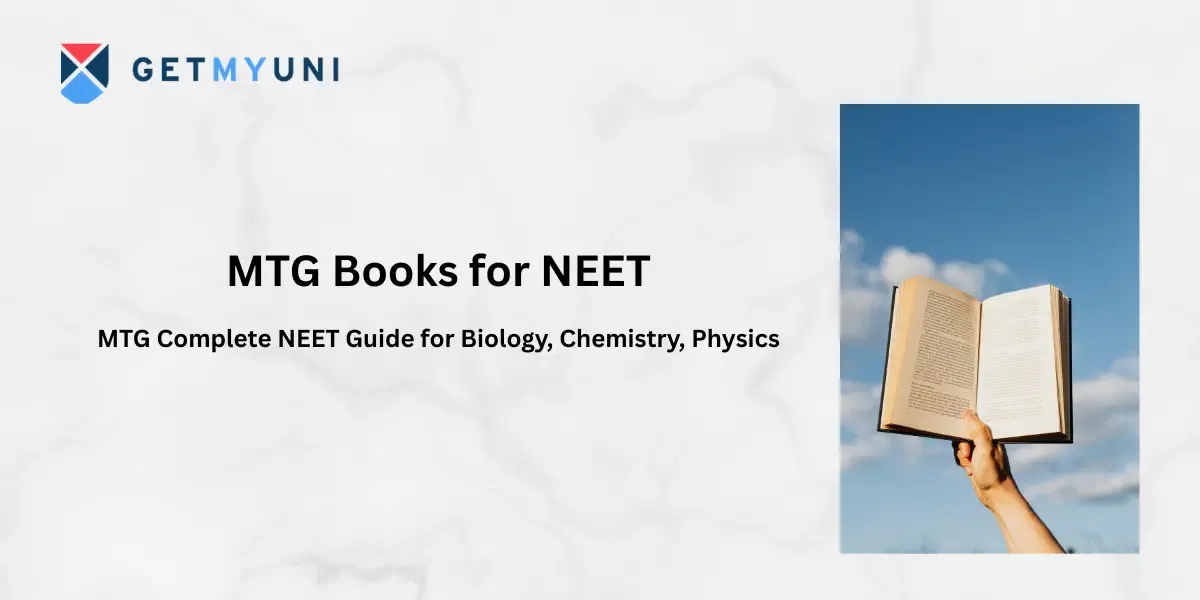NEET chapter-wise weightage 2026 of Physics, Chemistry, and Biology differs. Chemical bonding, organic chemistry, human physiology, genetics and evolution, ecology and environment, plant diversity, the law of motion, and magnetic effects are some of the NEET chapters with high weightage.
Table of Contents
NEET chapter wise weightage 2026 for each paper differs. In Biology, the Chapter Human Physiology and Genetics and Evolutions held the most weightage. In Physics, Thermodynamics and Laws of Motion held the maximum weightage. Chemical bonding, organic chemistry, and physical chemistry hold more weight in Chemistry.
NEET is organised exclusively for admissions into various medical institutions for UG medical education. NEET UG helps gauge the wisdom of the students applying for medical courses as this is a nationwide examination the competition level is expected to be high.
NEET Biology Chapter-Wise Weightage 2026
The NEET biology syllabus 2026 is categorised into botany and zoology, carrying 100% weightage. This is one of the crucial papers in NEET UG. Therefore, we have presented the NEET chapter wise weightage of Biology 2026 below:
| NEET Biology Chapter-Wise Weightage PDF 2026 Direct Link | Download PDF |
| Chapters | Average no. of Questions | Weightage (In %) |
| Botany | ||
| Plant Diversity | 7 | 12% |
| Plant Anatomy | 2 | 4% |
| Plant Reproduction | 5 | 9% |
| Genetics and Evolution | 15 | 24% |
| Bio-molecule | 2 | 3% |
| Plant Physiology | 8 | 13% |
| Morphology of Flowering Plants | 4 | 7% |
| Cell Structure & Function | 6 | 10% |
| Ecology and Environment | 10 | 16% |
| Zoology | ||
| Animal Kingdom | 3 | 10% |
| Origin & Evolution | 3 | 10% |
| Animal husbandry | 1 | 3% |
| Human Reproduction & Reproductive Health | 5 | 18% |
| Structural Organization in Animals | 2 | 5% |
| Human Physiology | 13 | 45% |
| Biology and Human Welfare | 1 | 2% |
| Human Health & Diseases | 3 | 9% |
Also Check: How to Improve Speed and Accuracy in NEET?
NEET Chapter-Wise Biology Syllabus 2026
Biology carries fifty percent of questions for NEET UG. Therefore, knowing the syllabus becomes very important. The NEET syllabus 2026 will cover both class XI and XII topics. Therefore, channelling more focus on each chapter for better scoring is required.
| Syllabus for Class XI | Syllabus for Class XII |
| Structural Organisation in Animals and Plants | Ecology and environment |
| Human physiology | Reproduction |
| Diversity in Living World | Biology and Human Welfare |
| Plant Physiology | Biotechnology and Its Applications |
| Cell Structure and Function | Genetics and Evolution |
Read More: NEET Biology Syllabus 2026: Download PDF, Preparation Tips
NEET Physics Chapter-Wise Weightage 2026
NEET physics chapter-wise weightage, including the frequency of questions, is displayed below. Students are encouraged to follow the table and concentrate on the NEET chapter-wise weightage of the syllabus. This will help in scoring good marks.
| NEET Physics Chapter-Wise Weightage PDF 2026 Direct Link | Download PDF |
| Chapters and topics | Average No. of Questions | Weightage (In %) |
| Centre of Mass | 1 | 1% |
| Wave optics | 2 | 4% |
| Kinematics | 1 | 2% |
| Gravitation | 2 | 3% |
| Mechanical Properties of Solids & Fluids | 2 | 3% |
| Laws of Motion | 3 | 7% |
| Rotational motion | 1 | 1% |
| Motion of System of Particles and Rigid Body | 3 | 7% |
| Units and Measurement | 1 | 2% |
| Oscillations | 1 | 3% |
| Work, Energy and Power | 2 | 4% |
| Kinetic Theory | 1 | 2% |
| Waves | 2 | 4% |
| Thermal Properties of Matter | 1 | 2% |
| Thermodynamics | 3 | 7% |
| Properties of Bulk Matter | 1 | 3% |
| Electric Charges & Fields | 1 | 2% |
| Electromagnetic Waves | 1 | 1% |
| Magnetic Effects of Current & Magnetism | 3 | 6% |
| Electrostatics | 1 | 3% |
| Alternating Currents | 1 | 3% |
| Electrostatic Potential & Capacitance | 1 | 2% |
| Electromagnetic Induction | 1 | 2% |
| Current Electricity | 3 | 6% |
| Atoms & Nuclei | 2 | 5% |
| Semiconductor Electronics: Materials, Devices and Simple Circuits |
3 | 6% |
| Ray Optics & Optical Instrument | 3 | 5% |
| Dual Nature of Radiation and Matter | 2 | 4% |
Important: Tips to Score 150+ Marks in the NEET Physics
NEET Chapter-Wise Physics Syllabus 2026
The NEET physics chapter-wise syllabus is displayed below. Students can begin preparing for NEET UG after passing the class XI boards. The primary source of information is considered to be NCERT. Simultaneously with class XII board preparation, they can study for NEET.
| Syllabus for Class XI | Syllabus for Class XII |
| Physical-world and measurement | Electromagnetic Induction and Alternating Currents |
| Work, Energy and Power | Magnetic Effects of Current and Magnetism |
| Thermodynamics | Optics |
| The motion of System of Particles and RigidBody | Electrostatics |
| Kinematics | Electromagnetic Waves |
| Properties of Bulk Matter | Dual Nature of Matter and Radiation |
| Laws of Motion | Atoms and Nuclei |
| Gravitation | Electronic Devices |
| The behaviour of Perfect Gas and KineticTheory | Current Electricity |
| Oscillations and Waves |
Read More: NEET Physics Syllabus 2026: Download PDF, Preparation Tips
NEET Chemistry Chapter-Wise Weightage 2026
The chemistry syllabus is divided into physical, organic, and inorganic chemistry. For a better understanding and marks distribution pattern, we have divided the table according to the NEET chapter wise weightage of Chemistry. Also, the frequency of questions from each chapter is highlighted.
| NEET Chemistry Chapter-Wise Weightage PDF 2026 Direct Link | Download PDF |
| Chapters and topics | Average no.of Questions | Weightage (In %) |
| Inorganic Chemistry-I | 22% | |
| Chemical Bonding | 4 | 9% |
| Hydrogen | 1 | 2% |
| Periodic Table & Periodicity in Properties | 2 | 4% |
| p-block | 3 | 7% |
| s-block | 1 | 3% |
| Inorganic Chemistry-II | 12% | |
| Coordination Compounds | 3 | 6% |
| Qualitative Analysis | 1 | 2% |
| Metallurgy | 1 | 2% |
| D-block & F-block Elements | 2 | 4% |
| Organic Chemistry-I | 8% | |
| Hydrocarbons | 2 | 4% |
| General Organic Chemistry | 2 | 5% |
| Organic Chemistry-II | 26% | |
| Haloalkane | 1 | 2% |
| Aldehydes, Ketones and Carboxylic Acids | 2 | 3% |
| Chemistry in Everyday Life | 2 | 3% |
| Environmental chemistry | 1 | 2% |
| Aromatic Compounds | 3 | 6% |
| Biomolecules | 2 | 4% |
| Carbonyl Compounds | 2 | 4% |
| Organic Compounds containing nitrogen | 2 | 3% |
| Polymer | 1 | 2% |
| Alkyl Halide, Alcohol & Ether | 2 | 4% |
| IUPAC & Isomerism | 2 | 4% |
| Practical Organic Chemistry | 1 | 2% |
| Physical Chemistry-I | 17% | |
| Atomic Structure & Nuclear Chemistry | 1 | 3% |
| Gaseous State | 1 | 3% |
| Mole Concept | 2 | 5% |
| Redox Reactions | 1 | 2% |
| Chemical Equilibrium | 1 | 3% |
| Ionic Equilibrium | 2 | 4% |
| Thermodynamics and Thermochemistry | 1 | 3% |
| Physical Chemistry-II | 15% | |
| Chemical Kinetics | 2 | 4% |
| Solution & Colligative Properties | 2 | 4% |
| Surface Chemistry | 1 | 2% |
| Electrochemistry | 1 | 3% |
| Solid State | 1 | 3% |
Also Check: How to Crack NEET 2026?
NEET Chapter-Wise Chemistry Syllabus 2026
The scoring of marks depends on how well a student knows the syllabus. The mentioned table below displays the syllabus. For better regarding the examination, candidates are advised to follow this.
| Syllabus for Class XI | Syllabus for Class XII |
| Some Basic Concepts of Chemistry | Solutions |
| Structure of Atom | Solid State |
| States of Matter: Gases and Liquids | Chemical Kinetics |
| Thermodynamics | Electrochemistry |
| Classification of Elements and Periodicity in Properties | Surface Chemistry |
| Redox Reactions | Coordination Compounds |
| Organic Chemistry- Some Basic Principles and Techniques | Alcohols, Phenols, and Ethers |
| Chemical Bonding and Molecular Structure | Haloalkanes and Haloarenes |
| Hydrogen | Organic Compounds ContainingNitrogen |
| Equilibrium | Chemistry in Everyday Life |
| Environmental Chemistry | Aldehydes, Ketones, and carboxylic acids |
| Hydrocarbons | General Principles and Processes of Isolation of Elements |
| s-Block Element (Alkali and Alkaline earth metals) | d and f Block Elements |
| Some p-Block Elements | p- Block Elements |
| Biomolecules | |
| Polymers |
Read More: NEET Chemistry Syllabus 2026: Download PDF, Preparation Tips
New NEET Exam Pattern 2026
Candidates aspiring to pursue medical courses are advised to follow the NEET exam pattern 2026 for better understanding. According to the new structure, the exam will be conducted in an MCQ pattern, where they will ask 200 questions. Candidates have to answer only 180 among them.
Furthermore, each subject will have two sections, i.e., A and B. Section A will have 35 questions, while section B will have 15 questions.
| NEET Exam Pattern | Details |
| Exam Mode | Pen and paper mode. |
| Duration of Exam | 3 hours |
| Total Number of Questions | 200 |
| Total Questions to be Attempted | 180 |
| Marking Scheme | 4 marks will be awarded for each correct answer |
| 1 mark will be deducted for each incorrect answer | |
| No marks will be awarded or deducted for unanswered questions | |
| Question Type | Multiple choice questions (MCQ) |
| Total Marks | 720 |
Also Check: NEET Exam Instructions 2026


![Banaras Hindu University, [BHU] Varanasi](https://media.getmyuni.com/azure/college-image/small/banaras-hindu-university-bhu-varanasi.jpg)
![Jamia Millia Islamia [JMI]](https://media.getmyuni.com/azure/college-image/small/jamia-millia-islamia-university-new-delhi.jpg)
![Manipal Academy of Higher Education, [MAHE] Manipal](https://media.getmyuni.com/azure/college-image/small/manipal-university-mu-manipal.jpg)
![Aligarh Muslim University, [AMU] Aligarh](https://media.getmyuni.com/azure/college-image/small/aligarh-muslim-university-amu-aligarh.jpg)























POST YOUR COMMENT